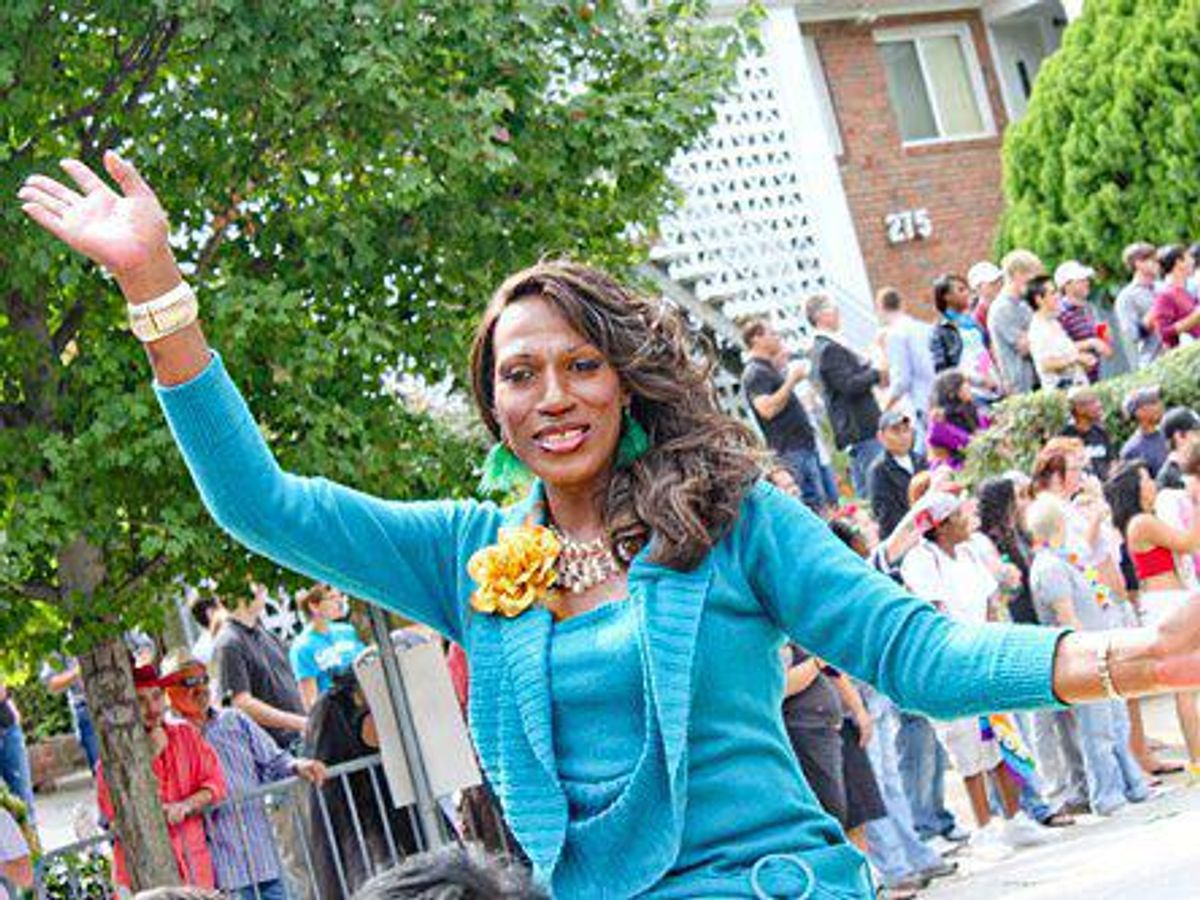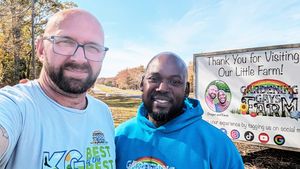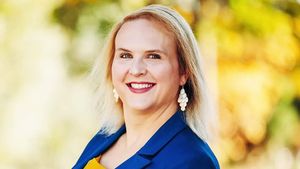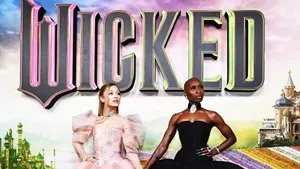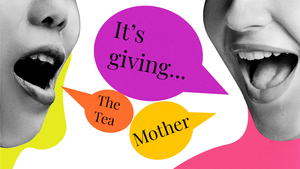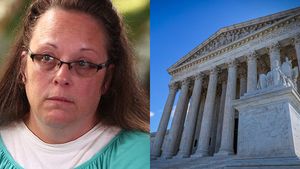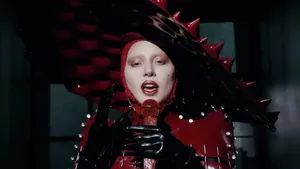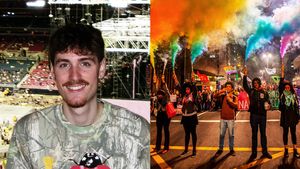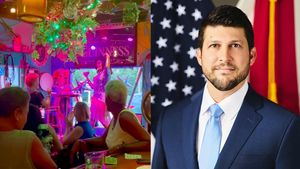It’s about time Dee Dee Chamblee was honored for her HIV activism. Even the White House recognized her In 2011, when she was picked as one of Obama’s nine “Champions of Courage” in commemoration of the 30th anniversary of the AIDS epidemic.
Chamblee was also chosen as a grand marshal for 2011’s Atlanta Pride; and earlier this year, she was again honored by Atlanta’s LGBT community at the 2nd Annual Our Founding Valentines: Celebrating Our Pioneers hosted by Atlanta Pride and Touching Up Our Roots (Georgia’s LGBT history project).
A long-term survivor featured in our coverage of The Missing Generation, Chamblee was diagnosed 29 years ago, in 1987, a time Chamblee has described as “a holocaust.”
“We couldn’t even keep up with how many people were dead,” Chamblee explains. “It was like at least two or three every other day of your friends, of people you know. And we had no grief counseling or anything like that. So the community just kind of like blotted it dry.”
Chamblee is happy and healthy today. She’s been married for more than two decades and her husband remains HIV-negative. Chamblee herself looks impossibly young for being 56 and having had a difficult life “going to jail, prostituting, drugs, and all that,” and the kind of AIDS-related illnesses that would have killed a lesser woman.
At one point, she overcame tuberculosis, only to get sick again, and see her T-cells plummet and hover near zero.
“I lived on those three T cells — I call them the Father, the Son, and the Holy Ghost — for the next 10 years,” Chamblee told The Body. The key to her finally getting well? “I had built up my self-esteem and my mental health had improved to such an extent, that that really was a key ingredient, besides the medicine, that helped me to keep going.”
Coming out as trans and poz eventually added to her positive mental health — but not before her family said things like, “We already felt like you was dead when we found out you were transgender.”
Chamblee acknowledges that parents often do go through a mourning period after learning their child is trans, but, being trans and positive, is “kind of like you're dealing with a quadruple stigma. You're dealing with being black, you're dealing with being transgender, you're dealing with being poor and uneducated, and then you're dealing with [HIV]. Every day is a fight — a fight to use the bathroom, a fight to get a job, a fight to get people to respect you as you present yourself, a fight just to have normal human rights everyone else takes for granted every day.”
To help other trans women win that fight, Chamblee founded LaGender, an organization which not only provides resources for the trans community (including around HIV) but provides educational workshops and trainings those working with or providing services to transgender individuals.
“We found out that the best way to get the doors open to the services that are available to trans people is to get the staff and the organizations and professional businesses educated on gender identity,” she told The Body.
She works to help trans people who are “really in dire, dire straits. You know, they are really on the fringes of committing suicide, and of great depression. And the young ones — [we’re] trying to prevent them from becoming HIV positive. … Health disparities come into play when you are homeless and there's nowhere for you to go. You've got to go out on the street and sell your body. That's our only alternative, for a trans person. Because no one will hire you.”
Having faced those issues herself Chamblee knows what it’s like to overcome them as well. “It turned out,” she explained. “[That] those happened to be the issues that gave me triumph, too.” The former jail inmate is thrilled that she can now go to the local jails and conduct support groups in there for the transgender people.
“I got on the task force with the Atlanta police department, and we developed a relationship with the city chief of police,” she said in 2013. “And that brought about a change.”
Chamblee says she became an activist because “somebody had to do it. And somebody had to … be able to stand up and talk for the community that I represent.”
She stands up frequently now, having served on numerous boards including Positively Trans, Atlanta GLBT Task Force, The Center for Excellence in Transgender Health, and The LGBT Institute.
When Atlanta’s police department started to “banish” sex workers (and those assumed to be sex workers) from the business district, Chamblee stood up again, arguing that they were "targeting transgender prostitutes.”
To fight the crackdown, Chamblee helped launch Solutions Not Punishment, a coalition of the organizations including LaGender, Racial Justice Action Center’s Women on the Rise, and Trans(forming).
“I had been locked up more times for not committing a crime than for the times I was committing one,” Chamblee said, testifying on the subject to the city council. She was referencing the fact that many jurisdictions arrest women for “intent to solicit” or even “loitering with intent to solicit.” These laws (which frequently carry added penalties for those who are HIV-positive) are also disproportionately used to target and criminalize trans women.
Chamblee added, “With the resources and the business people down in midtown that pushed this banishment — to banish these people — through, couldn't you have turned that money and those resources around and created a resource center, and offered them a job, and job training?"
Remarkably, the Atlanta city council decided to table the policy, and sent the issue to a “working group,” Chamblee says, to see if they could, “come up with a better solution. I mean, if you can build a billion-dollar stadium — that we don't need — here in Atlanta, why can't you take care of our own?”
Earlier this year Chamblee demanded an apology and led a protest against a municipal court representative who repeatedly misgendered her and questioned her right to identify as female.
Chamblee had been appearing in a traffic court in East Point (a suburb of Atlanta) when Solicitor General Antavius Weems referred to her as “Mister,” and “he” despite her presentation as female. She was then reportedly pulled in to a “private room, interrogated about her gender reassignment surgery, lied to about the law, and threatened with jail time.”
Nearly two dozen supporters joined Chamblee in marching to the court building and confronting Weems with demands for an apology — and better training for court personnel.
“As a trans woman who has lived in East Point for 16 years,” she told Georgia Voice at the time, “I have never before encountered this type of treatment from someone in a professional position. I felt verbally assaulted. Truthfully, I felt like he was intentionally trying to humiliate me.”
Although Weems insisted having cameras and cell phones confiscated ahead of time, he did meet with Chamblee and her supporters. He also refused to apologize for publicly misgendering her and insisted that "the law,” required him to address her according to the gender marker on her identification documents.
Lambda Legal’s Holiday Simmons attended the meeting and told the Georgia Voice while there is no such law, Weems addressed Chamblee appropriately in their private meeting.
“Outside of the court, he addressed her correctly because he said that he respects her and doesn’t want her to feel disrespected,” Simmons reported. “But the same would not hold true in a courtroom.”
Despite Weems’ refusal to apologize, the protest proved successful: He is now working with Simmons and Lambda Legal to draft a policy for addressing people by their preferred pronoun in court.
Long term, Chamblee dreams of taking care of her own by opening a trans-specific clinic that would offer both hormones and HIV treatment. She also wants to see transitional housing set up to help transgender kids who “are being thrown out, homeless, on the street.”
According to the National Center for Transgender Equality, “One in five transgender individuals have experienced homelessness at some point in their lives. Family rejection and discrimination and violence have contributed to a large number of transgender and other LGBQ-identified youth who are homeless in the United States — an estimated 20-40 percent of the more than 1.6 million homeless youth.”
As much of a role model as she's become, Chamblee doesn’t want another generation of trans youth to have to follow in her footsteps through homelessness, survival sex, and living with HIV.
